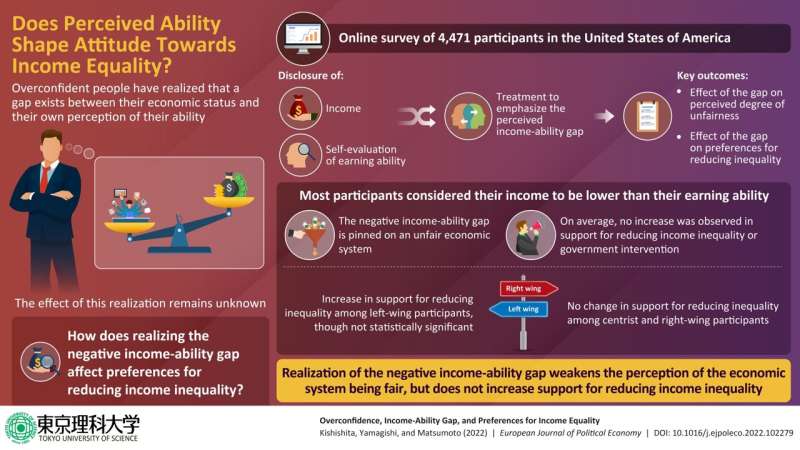#The role of overconfidence and perceived ability in preferences for income equality

Table of Contents
“The role of overconfidence and perceived ability in preferences for income equality”

Overconfidence in one’s ability is not uncommon among humans. It can be observed in areas ranging from driving ability and productivity to calculating returns on investment projects. Overconfidence can also lead people to think that they aren’t earning as much as they think they can.
This consideration should encourage overconfident people to think that society is unfair. Furthermore, this effect should increase the support for more concentrated efforts, including government interventions, to reduce the income inequality and mitigate the perceived unfairness of society. However, is this really the case?
A new study by researchers from Tokyo University of Science and Princeton University seeks to answer this question. The research team, which included Junior Associate Professors Tomoko Matsumoto and Daiki Kishishita from Tokyo University of Science and Atsushi Yamagishi from Princeton University, aimed to find out how the preferences of overconfident people, specifically those concerning income inequality, change when they are made aware of a gap between their economic status and their self-evaluated ability.
The study was made available online in the European Journal of Political Economy.
“There is a large variation in the level of inequality in countries with similar levels of income redistribution, in terms of the degree to which people support or oppose income redistribution. We are interested in understanding why those who benefit economically from the implementation of income redistribution policies oppose such policies, and have focused on the nature of the ‘self-confidence overload’,” says Dr. Matsumoto, explaining the rationale for their study.
To this end, the researchers conducted an online survey in the United States with 4,471 participants. The survey was framed in such a way that the questions reinforced a participant’s self-perceived income-ability gap randomly. The novelty of the study stems from the fact that previous studies have been lab-controlled experiments. However, this study tests the presented theory in a real economic environment using the actual income values of the participants.
The study yielded a number of surprising results. The researchers found that participants who stated that their income was lower than their ability to earn lose their confidence in meritocracy and their faith in the economy being fair. They view the economy and society as being unfair, which hinders them to earn to their full potential. The researchers also noted that people believed that negative income-ability gap was a result of an unfair economy and not an individual responsibility.
Upon realizing the negative income-ability gap, more left-wing participants were in favor of reducing income inequality than right-wing and centrist participants. However, people across the political spectrum did not favor government intervention as a way to reduce income inequality. Government intervention did not garner a lot of support even among left-wing participants with high trust in the government.
Explaining this anomaly, Dr. Matsumoto says that “scholars have previously argued that characteristics such as party ideology or family and personal values are major determinants of preferences for redistribution and changing a belief about social and economic environments may have a limited role. Their limited effect on preferences for reducing income inequality may stem from a similar mechanism.”
Interestingly, it was noted that people following a right-wing ideology showed higher support for ensuring that people get paid according to their ability than government intervention.
The researchers believe their findings would be relevant in countries apart from the United States, as overconfidence in one’s ability is prevalent across the world. However, they anticipate differences based on the population’s belief in the state of their economy. Addressing the implications of their findings, Dr. Matsumoto says, “I believe that identifying who is for and who is against reducing inequality will help to alleviate social conflicts in a society where inequality is growing and polarization is increasing.”
New method of measuring economic inequality could improve policy outcomes
Daiki Kishishita et al, Overconfidence, income-ability gap, and preferences for income equality, European Journal of Political Economy (2022). DOI: 10.1016/j.ejpoleco.2022.102279
Citation:
The role of overconfidence and perceived ability in preferences for income equality (2022, September 20)
retrieved 20 September 2022
from https://phys.org/news/2022-09-role-overconfidence-ability-income-equality.html
This document is subject to copyright. Apart from any fair dealing for the purpose of private study or research, no
part may be reproduced without the written permission. The content is provided for information purposes only.
If you liked the article, do not forget to share it with your friends. Follow us on Google News too, click on the star and choose us from your favorites.
For forums sites go to Forum.BuradaBiliyorum.Com
If you want to read more Like this articles, you can visit our Science category.


